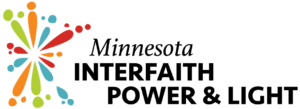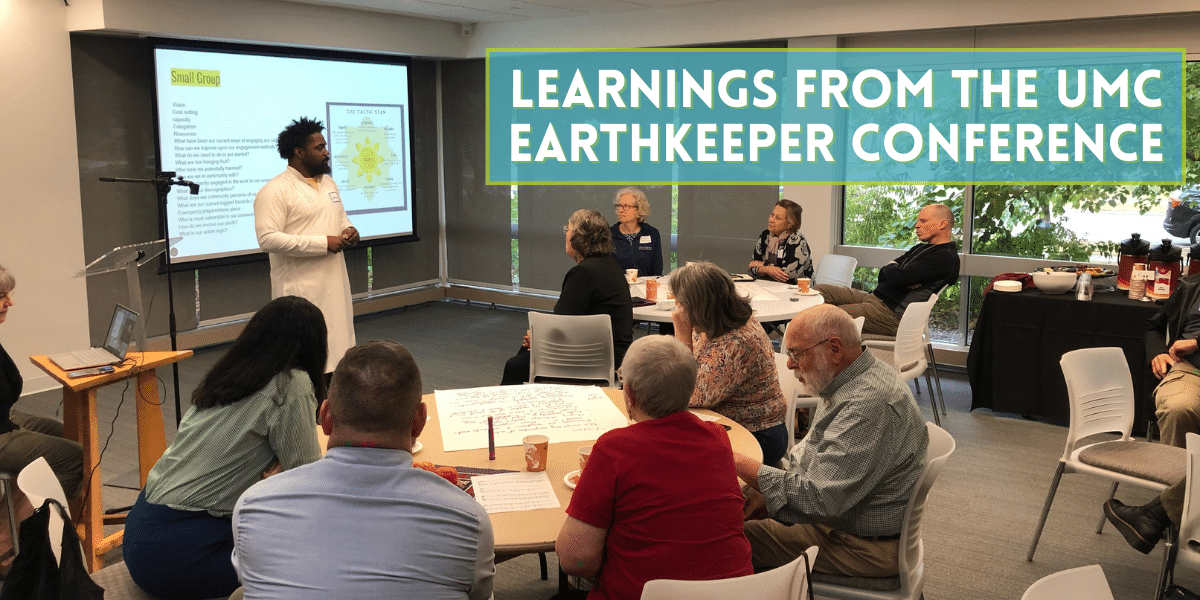Recognizing our Connection to this World and Each Other: Learnings from the United Methodist EarthKeeper Gathering
Earlier this month, MNIPL’s Climate Justice Organizer Joshua Lewis attended a meeting of EarthKeepers from United Methodist congregations across the state. EarthKeepers are groups of United Methodist congregants who are growing their congregations’ commitment to environmental justice, antiracism, and community organizing.
From John Wesley to Indigenous Ways of Knowing
The conversations at this gathering focused on how to connect the United Methodists’ understanding of God’s creation to tangible action toward living in deeper, more interdependent relationship with the Earth. Dr. Timothy Eberhart, a professor of ecological theology and practice connected the teachings of Methodism leader John Wesley to Indigenous understandings of human beings as part of an interconnected kinship with human and non-human life on this planet. Wesley posited and United Methodists believe that God is love and that everything that God has created is part of that love, which Dr. Eberhart connected to Indigenous beliefs that humans are part of, not apart from, nature. He pushed the EarthKeepers present to connect their environmental work to Indigenous rights movements and to other movements working to move from an economy of extraction and greed to a world of interconnectedness and care.
The Leaves of a Future Paradise
Dr. Nancy Victorin-Vangerud connected the work of environmental justice to Biblical descriptions of a restored future paradise where the leaves of the tree of life are “healing nations.” These leaves can be many things: the leaves that use the sun’s power to create fruit to feed the world, the decaying leaves that become compost for other things to grow, the metaphorical leaves of recorded teachings that we share with one another. But Dr. Victorin-Vangerud also argued that these leaves aren’t just metaphorical, but also a call to physically restore our world’s trees. She connected this to the work of organizations like the Zimbabwe Environmental Buddies, which is planting Indigenous trees and supporting young people’s visions of a greener future.
Community Self-Actualization and Resilience Hubs
When Joshua spoke, he talked about the important of community actualization, or a community’s belief in and desire to be the best that they can be. Western understanding of needs often assumes that self-actualization is the last need to be addressed once biological and physiological needs are met, but the Sikisika Nation of the Blackfoot tribe has pushed back against that belief, arguing that self-actualization needs to come first if we’re to live in interdependence with ourselves and nature. Joshua talked about the intersections of class, race, and the environment and pushed for the Earthkeepers to connect community healing with their environmental work.
He also talked about the important opportunities that spiritual, faith, or religious communities have in helping their communities achieve that self-actualization through MNIPL’s work on resilience hubs. These resilience hubs not only help communities weather the immediate threats of climate change like bigger storms, but also help develop a new way of being in community with each other. Resilience hubs offer programs and services, infrastructure for support and connection, communications in times of crisis and in blue skies days, operations in a space and with people the community trusts, and literal and figurative power to keep phones charged and to make community voices heard. Joshua encouraged each of the EarthKeepers to be part of our Community Climate Resilience Hub Network to use the knowledge and expertise of others in our state and country, to get access to local, state, and federal funding that has been allocated for resilience hubs, and to grow their ability to be places of refuge and growth for their communities.
What will you do to grow community self-actualization?
- Reflect on what it means to be in interdependence with our human and ecological communities. Can you find joy and purpose in developing harmonious relationships with the human and non-human communities around you?
- Begin the conversation with your faith, spiritual, or religious community (or any other organization you might be part of) about becoming a resilience hub. Reach out to Joshua (joshua@mnipl.org) to learn more and to join the Community Climate Resilience Hub Network, which is launching in January!
Thank you so much to the United Methodist EarthKeepers for inviting Joshua to speak!

